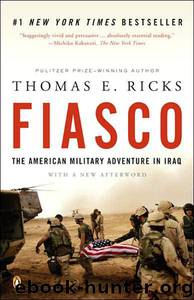Fiasco: The American Military Adventure in Iraq by Thomas E. Ricks

Author:Thomas E. Ricks
Language: eng
Format: mobi, epub, azw3
ISBN: 9780143038917
Publisher: Penguin Books
Published: 2006-01-02T00:00:00+00:00
Friendly fire worsens Fallujah’s woes
As the war intensified in the summer, it brought with it a series of incidents in which newly wary U.S. troops fired on civilians, such as carloads of families hurrying to get home before curfew. A Reuters cameraman was killed because a soldier thought the device on his shoulder, seen from a distance, looked like a launcher for a rocket-propelled grenade. In the most consequential of these incidents, on September 12, a platoon from the 82nd Airborne mistakenly became embroiled in a night firefight with Iraqi police near Fallujah. Eight Iraqi police officers died in the clash, which was caused by a lack of coordination with the police and their shortage of proper equipment. A BMW had shot up a police station. Iraqi police gave chase in a truck and passed American troops; then, giving up, they turned around. When the truck, which had a heavy machine gun mounted on it, made its U turn, the platoon thought it was coming under attack. Eventually, Jordanian police working at a nearby hospital also got involved.
Iraqi police interviewed later by reporters said they had tried desperately to get the Americans to stop. Thousands of rounds of ammunition, many of them heavy caliber, were fired, according to Stars & Stripes, the U.S. military newspaper. “They shot at us for about an hour,” Sgt. Assem Mohammed, one of the police officers, said later, while recovering from a gunshot wound at Fallujah General Hospital. “They kept firing, and we kept shouting at them, ‘We are police! We are police!’” In the course of the three-way firefight—which involved U.S., Iraqi, and Jordanian police, who were all ostensibly allies—a good part of the nascent Fallujah police force was killed.
“It was the deadliest friendly-fire incident in the six-month-old occupation, and it left tremendous bitterness on both sides,” wrote Bing West, the defense analyst who spent months observing U.S. operations in Anbar province.
In the weeks after that, Kipling, the MP officer, recalled, the Iraqi police frequently were wary of U.S. troops. “More than once the Iraqi police would say something along the lines of ‘You and your soldiers are okay, but those others are dangerous,’” she said.
In the wake of the incident, Keith Mines tried to get the attention of his superiors. He had arrived in the province in midsummer, somewhat concerned about the direction of the occupation, but still believing that it could be put right. The diplomat, a former Special Forces officer, knew that in counterinsurgencies, the solutions tended not to be military. “Police, [electric] power and political process,” he wrote to his family in August. “That is what will fix this place, and if we give them those three we can get the heck out of here.” But that wasn’t the path the occupation would take. By September Mines began to turn pessimistic. “The president has received some profoundly bad advice on this, and unfortunately the same people who gave him bad advice to begin with are the ones trying to help dig him out,” he wrote in a depressed letter to a State Department colleague.
Download
Fiasco: The American Military Adventure in Iraq by Thomas E. Ricks.epub
Fiasco: The American Military Adventure in Iraq by Thomas E. Ricks.azw3
This site does not store any files on its server. We only index and link to content provided by other sites. Please contact the content providers to delete copyright contents if any and email us, we'll remove relevant links or contents immediately.
| Africa | Americas |
| Arctic & Antarctica | Asia |
| Australia & Oceania | Europe |
| Middle East | Russia |
| United States | World |
| Ancient Civilizations | Military |
| Historical Study & Educational Resources |
Debriefing the President by John Nixon(752)
The Good Soldiers by Finkel David(635)
Murphy's Law by Jack Murphy(614)
40 by G. B. Trudeau(542)
The Savior Generals: How Five Great Commanders Saved Wars That Were Lost—From Ancient Greece to Iraq by Victor Davis Hanson(529)
The Trident by Jason Redman(516)
The Trident by Jason Redman John Bruning(448)
Knife Fights by John A. Nagl(410)
The Greatest Story Ever Sold by Frank Rich(409)
The Longest War by Peter L. Bergen(408)
Carnivore by Dillard Johnson(404)
Yellow Green Beret : Stories of an Asian-American Stumbling Around U.S. Army Special Forces by Wong Chester(392)
No True Glory by Bing West(390)
American Sniper: The Autobiography of the Most Lethal Sniper in U.S. Military History by Chris Kyle(360)
Purple Hearts & Wounded Spirits by Moore Brian(355)
In the Company of Soldiers by Rick Atkinson(349)
Fiasco: The American Military Adventure in Iraq by Thomas E. Ricks(340)
Tom Sileo by Brothers Forever(337)
Mass Casualties by Anthony Michael(332)
